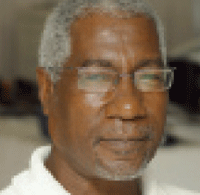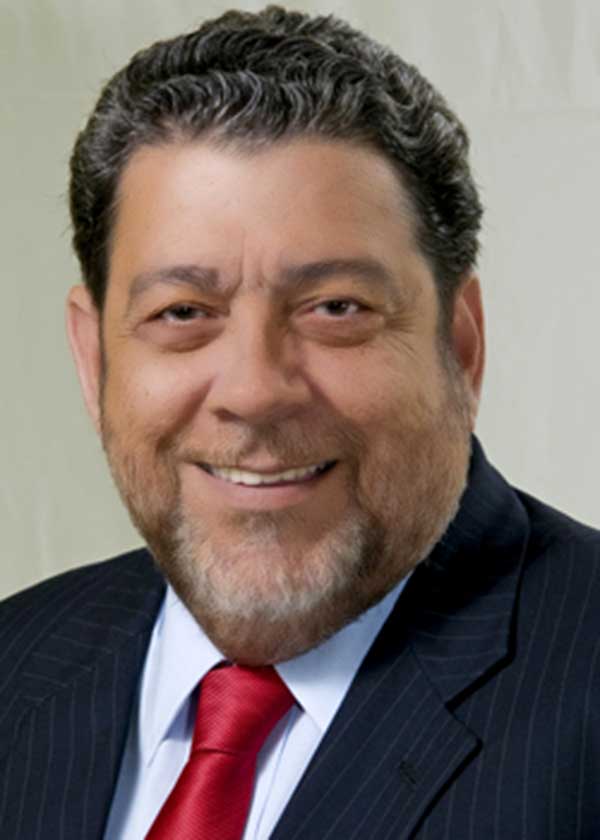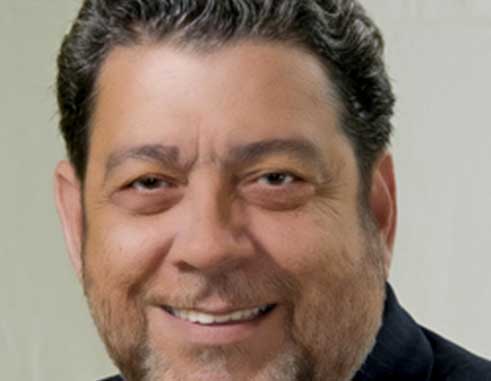NO MACRO FIGMENT OF FERTILE IMAGINATION.

WITH elections in the air in both Saint Lucia and Jamaica, the Saint Vincent and the Grenadines Prime Minister’s call for the Caribbean to replace bananas with marijuana as the region’s next cash crop is certainly ringing loud bells in the ears of Caribbean people.
It is understandable that Dr Gonsalves would be the first CARICOM leader to openly promote marijuana production and export. His country was the first to have an organized and publicly identified ‘Marijuana Farmers’ group that engaged in formal interactions with government and openly promoted the transition from bananas to cannabis.
Indeed, even before Prime Minister Gonsalves had come around to their position, the multi-island-state’s marijuana farmers had hit the streets protesting the destruction of their crops by American soldiers deployed to their mountainous fields by US helicopters through the infamous Operation Airbridge.
Back then Dr Gonsalves toed the general line of bowing to the will of the US and the UK in treating marijuana as a “dangerous drug” that was classified as a narcotic and considered no less dangerous than cocaine. Cigarettes and alcohol had long been accepted despite their proven dangers and cancerous causes. And from 1976, the island fell in line with Britain and the US’ demands that marijuana be classified as a dangerous drug, use and possession of which was prohibited and stiffly punished.
It’s taken all of 40 years for the sovereign nations that comprise the CARICOM grouping to come around to agreeing to discuss – just discuss – the merits and demerits of decriminalizing or legalizing marijuana, allowing for small quantities for personal use, but also for promoting its medical uses and the industrial use of the cannabis plant.

It was indeed a bold move when the region’s leaders agreed to discuss changing gear on marijuana. But it was also a late move, coming as it was, long after the USA, Canada and Europe had not only shifted gears but moved far along the road of relaxation of outlawing and penalties and instead encouraging research and development of the herb, use its stems and roots for medicine and treating it as a near-future lucrative commodity with global sales and profit potential.
Indeed, while marijuana use and possession remains illegal in most (if not all) CARICOM states today, some have taken small steps to showly they are willing to go the full way. Jamaica was first to say and show it was willing, to free-up a certain quantity of weed and now Belize has also legalized a certain small amount for recreational use. The University of the West Indies (UWI) Mona Campus and other researchers in Jamaica have also taken their research into the medical uses of marijuana to another level. But in most countries too, even while the herb remains illegal the police seem now more interested in chasing down the cocaine dealers than arresting a Rastaman for having a joint, or a few marijuana seeds.
All that may sound and look good, but as Dr Gonsalves told a UWI crowd earlier this week, we’re still moving too slowly. He said earlier this month at home that if the Caribbean isn’t careful and remains behind in the marijuana race, “we will continue to be drawers of water and hewers of wood” while the USA, Canada and Europe reap the profits of removing marijuana from the dark shadows of illegality through a more enlightened approach that sees it as a potential Caribbean crop that can (and already is, in real terms) more lucrative than bananas.
He doesn’t at all minimize the contribution of bananas to the economies of the Windward Islands and Jamaica over the years, but, correctly pointed out to the crowd of (some of) the region’s best brains at the UWI’s 40th anniversary observance in Barbados, banana cultivation over several decades also resulted in environmental and soil damage in those lands where the industry took hold. He argues – with facts – that marijuana production can be more environmentally friendly in this age of resistance to and avoidance of the elements that cause the negative effects of climate change on national environments.
Gonsalves definitely knows what he’s talking about. The evidence of marijuana being the next ‘gold rush’ that’ll develop into another ‘oil boom’ is quite clear in those US states where it has been decriminalized and allowed for sale for medical purposes. ‘Scrunting’ American farmers have become millionaires overnight by switching from potatoes and tomatoes to marijuana. A new industry has developed across the USA today, with lawyers and consultants advising on how to get in on the marijuana boom.
But it’s not only the small people getting big on dollars in marijuana in the USA. Mega investors are lining their cash up and already investing quietly in creating the way for cashing-in big on the coming marijuana boom. US investors are looking back at the benefits that followed the end of prohibition of alcohol and visioning a bright future when marijuana prohibition is lifted, not only in the USA but across the world. With Canada’s new Prime Minister Justin Trudeau having campaigned on a promise to legalize marijuana and several European states signalling they will not be left out in the cold, the likes of Warren Buffet and other American billionaires are already nearly-secretly investing in research and development of various new and old species of marijuana.
The Caribbean is already (somewhat) getting in on the lucrative marijuana business in America. Earlier this month, on the septuagenarian anniversary of Bob Marley’s birth, his family launched a series of marijuana-based oils and scents in his name. But while the emphasis remains on the marijuana plant and its uses for medicine or recreation, insufficient emphasis is being given to its potential as an industrial crop.
Use of cannabis as an industrial crop is widespread and growing, but particularly in developed countries where the plant can’t grow as easily as in the Caribbean. In such places, indoor ‘factories’ are constructed and fed by ‘laboratories’ full of cannabis plants, producing cannabis-based products ranging from textiles to essences. There are several persons and personalities in the Caribbean who have long advocated treating marijuana as a cash crop with an industrial and manufacturing base, but they have been largely ignored.
The time has now come for all CARICOM states to come to a conclusion on the issue of decriminalization of marijuana. The CARICOM Summit in Belize this week will have heard from the CARICOM Marijuana Commission and the Heads of Government will be clearer as to who among them is in favour and who is against. There will be those less willing to move forward as fast as others – or at all. But in this case where a vast majority is in support, mechanisms will have to be found to proceed where possible with the necessary speed while considering the hiccups of the conscientious objectors.
Caribbean investors must not make the mistake of seeing or treating the potentially lucrative global marijuana trade as figments of fertile imagination. Gonsalves has already pointed to the possibility of the Caribbean exporting its proven superior quality of the weed to the new Trudeau’s Canada. If it’s good for Warren Buffet to start investing in today, then the mega marijuana market of tomorrow should also be good for Caribbean investors.
The reality of marijuana today is so real that no other than National Geographic Magazine decided to dedicate its June 2015 cover page to the subject of ‘The New Science of Marijuana’ followed by 27 pages of words and photos in a feature article entitled ‘High Science’. The internet is also loaded with all the information any more Doubting Thomases will need to change their minds about marijuana today.
Bob Marley, reggae music and the rastafarians of old planted the seed more than four decades ago, tirelessly and purposefully cultivating a new and changed vision of it as not only a healer of men (and women) but a potential savior of nations. Four decades ago, those sounds and songs sounded way ahead of their time. Forty years later, a Prime Minister and former UWI lecturer is calling on the region’s governments and academics to take quicker steps to finally bring the region out of the darkness and into the light on how much time and money has been lost that could have been already working wonders for this region much earlier.
It’s always ‘better to be late than never.’ But being last in any race also means there’s nowhere else to go. We must therefore quickly change gear and accelerate our motion towards the vision!















Hmmmmmmmmmmmmmmmmmmmmmmmmmmm……………………